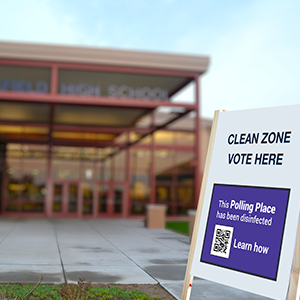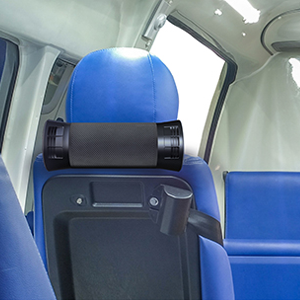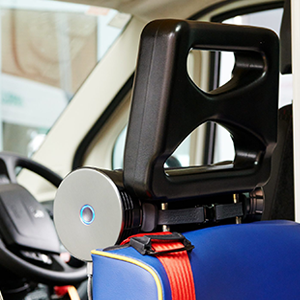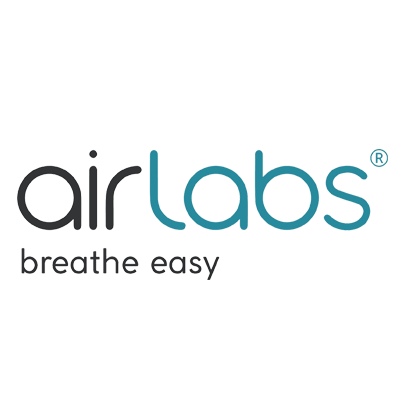
A ground-breaking street-level, real-time air quality sensor network has launched in Camden to fundamentally transform how government, businesses and the public monitor and manage air pollution in urban spaces.
The air quality specialist, AirScape, has installed more than 225 award-winning AirNode air quality sensors across the borough, in partnership with Camden Council and The Camden Clean Air Initiative.
The network provides 45x more spatial resolution and refreshes 60x more regularly than the existing network of air quality reference stations in Camden, capturing and reporting hyper-local air quality data every minute to map the issue in real time.
AirScape aims to replicate this approach across London and in every major city around the world, to enable real action on air pollution.
Dr Matthew Johnson, Chief Scientific Officer at AirScape, said: “Air pollution is one of the most profound issues facing humanity today. Tackling this crisis requires policy makers, businesses, and the general public to have a real-time, accurate understanding of air quality through accessible, publicly available data.
“Through this project, AirScape is making the invisible, visible. Our air quality sensor network in Camden delivers ultra-high-definition detail of local air pollution. The network is supporting policy makers to make data-driven choices to protect the health and wellbeing of the local community, whilst giving the public the ability to make informed decisions every day to reduce their exposure to air pollution.
“Camden is a vital first location for the deployment of AirScape, and our ambition is to install networks across every major city in the world, to enable a giant leap in our ability to tackle the air pollution crisis.”
Initial data from beta testing over the past month has already revealed a number of interesting findings. On a micro level, the platform can identify daily ‘incidents’ which occur on one street but not another, and extreme pollution differences in time, shown in rush hour NO2.
Findings include:
- Tuesday, 1st March, the day of tube strikes in London, led to high increases in rush hour NO2, as more people relied on road transport.
- Friday, 17th June, the hottest day of the year so far, saw unhealthy levels of Ozone across the Borough.
- Friday, 17th June, a large fire on Chalk Farm Road took place, which could be seen igniting and being extinguished on the AirScape platform, with a plume of harmful PM2.5 moving with the south westly wind to the northeast (images showcasing these findings can be found in the notes to editors below).
Local community groups are already showing interest in using the information from the platform. A local school group has used the data to conduct a lesson on air quality and local cycling groups are using the information to help choose the cleanest times and routes for cycle rides.
World Health Organization (WHO) data shows that almost all of the global population (99%) breathe air that exceeds WHO guideline limits and contains high levels of pollutants, with low- and middle-income countries suffering from the highest exposures.[i]
A recent report by the National Audit Office highlighted that the UK government is not on track to cut air pollution and is not effectively informing the public about the issue, so AirScape could be the ideal solution to meet both challenges by making detailed and impactful air pollution data available to all. [ii]
As the first local authority to adopt the AirScape network, Camden Council is leading public engagement on air quality in the UK, and the network is a blueprint for other local authorities to follow suit. The council was also the first to adopt WHO air quality standards, with a host of initiatives already in place to help realise its vision for a healthy and resilient borough.
Councillor Adam Harrison, Cabinet member for a sustainable Camden said: “Reducing air pollution is absolutely vital to improving the health and well-being of everyone in Camden. The detailed data from this network will revolutionise how we can engage with our community, giving us the power to make smarter, informed decisions to tackle air pollution.
“I’d like to thank AirScape, Camden Clean Air Initiative, Camden’s in-house team of air quality experts and street lighting team for their sterling work in getting this network set up. Making this data freely accessible to all members of our community further demonstrates the council’s longstanding commitment to the open sharing of data in the public interest.”
The revolutionary AirScape approach has been designed to engage a range of stakeholders and the general public in this critical issue. AirScape and The Camden Clean Air Initiative are working together closely to encourage local groups, businesses, NGOs and members of the public to engage with the platform, now publicly and freely accessible at https://airscape.ai.
The data generated from the network can be used in a myriad of ways, enabling the public to choose less polluted routes from A-to-B, feeding into local traffic management policy and providing NHS Trusts and schools with information to help raise awareness of air pollution and protect vulnerable communities.The future possibilities of how the data can be used are vast and AirScape is aiming to engage with potential partners, clean air groups and councils to explore future collaboration.
Public funding to roll out an initiative of this scale to the rest of London and in cities around the world is limited, so AirScape is raising private funding and sponsorship from multiple sources – from individuals to large corporates – to accelerate change and save lives.
Jeffrey Young, CEO of The Camden Clean Air Initiative, said: “Those living, working and visiting the Borough of Camden must be protected from exposure to toxic air pollution. In order to improve air quality, we must first understand its sources – exactly what the ground-breaking AirScape project allows us to do.
“By partnering with AirScape, The Camden Clean Air Initiative has put Camden on the map for GreenTech, giving people across the Borough the opportunity to make informed decisions on how to dramatically reduce exposure to air pollution. The AirScape project aligns directly with The Camden Clean Air Initiative’s vision to fill the Borough with real-time air quality sensors and place Camden at the forefront of the London’s sustainability agenda.”
With at least 40,000 premature deaths each year in the UK due to air pollution, toxic air is a known contributor to cancer, heart disease, strokes and asthma. Causing over 20x more deaths than road traffic accidents[iii], poor air quality costs society, businesses and our NHS services more than £15 billion a year. To reflect the increasing scientific evidence of the harm to health caused by toxic air, the WHO sharply reduced its guideline limits for air pollution last year.[iv]
Recent research produced by the non-profit group, the Central Office of Public Interest (Copi), and Imperial College London found that more than 97% of addresses in the UK exceed WHO limits for at least one of three key pollutants, while 70% of addresses breach WHO limits for all three.[v]
[i] WHO https://www.who.int/health-topics/air-pollution
[ii] NAO https://www.nao.org.uk/press-release/tackling-local-breaches-of-air-quality/
[iii] Brake.org https://www.brake.org.uk/get-involved/take-action/mybrake/knowledge-centre/uk-road-safety#:~:text=Road%20deaths%20and%20serious%20injuries%20in%20the%20UK&text=The%20number%20of%20road%20deaths,five%20a%20day%2C%20on%20average.
[iv] WHO – New WHO Global Air Quality Guidelines aim to save millions of lives from air pollution
[v] London.gov – Toxic air reducing far more slowly in outer London than central London

Digital identity is an idea whose time has come and the technology to power it and secure it is already here in the form of Folio.
1. IT’S ALL IN ONE
Just like a normal wallet, Folio stores everything you need in one place. That doesn’t just mean your credit and debit cards, but also your ID, store loyalty cards and any other important documents, too. That means the originals can stay safe at home.
Setting it up is simple. Take a selfie and a photo of your ID. (This can be your driver’s license, passport or national ID card.) The app uses its real-time checks to verify that it’s you. Then use the app to snap photos of the items you want aikdd to Folio. That’s it. You can use Folio to pay online, prove your age, or claim those crucial loyalty points at your favourite coffee shop or retail store.
2. IT’S MORE SECURE
If your debit card is lost or stolen, crooks can use it easily with contactless technology. Sorting it all out and saving your credit is a huge hassle. Getting into Folio is a whole different matter. If somebody finds your phone and somehow manages to unlock it, your valuable information is still safe.
Folio creates a biometric key from your selfie, but with far more comparison points and details than the facial recognition phones use. It also uses encryption to protect all your data that only you can access. It doesn’t get much safer than that.
3. YOU CAN’T LOSE IT
Losing your wallet or card is frustrating and time consuming to fix: Calling your bank, cancelling your cards, waiting for replacements. That’s not a problem if you lose your Folio-enabled phone. Folio allows you to backup all the app’s data in case it goes AWOL. As soon as you get a new phone you can safely restore your data in seconds from a secure backup.
4. IT’S MORE HYGIENIC
In the age of coronavirus, handling cash can be hazardous to your health. Think about how many people have handled that money before you. Yep, cash is filthy. There’s never been a better time to go cashless.
Things like Apple Pay and Android Pay mean you only touch your phone to buy stuff. Folio lets you pay cashless and avoid handing cashiers and clerks ID cards, rewards cards and other documents. That helps keep you safe.
5. IT SIMPLIFIES SHARING
Digital alternatives to traditional documentation are being widely accepted by businesses and governments around the world. Fewer and fewer people own printers and scanners, and fax machines are essentially dinosaurs used only by a few industries. Folio’s share function allows you to securely share documents and data with only who you choose and trust 100% – and only they ever see it. What’s more, it’s all done with a single tap. Folio is free to use on both iOS and Android. Find out more at folio.id.
*The original version of this article was published on www.stuff.tv

Smartmatic has teamed with The Infection Prevention Strategy (TIPS) to help election officials provide safe facilities for election workers and voters. TIPS is a nonprofit organization that exists to advance innovations, ideas and processes that make a difference in global health. Smartmatic, an SGO company and the global leader in election technology, has processed nearly 5 billion votes in elections on five continents.
After a customized risk-mitigation assessment, the combined team will provide election administrators a customized set of protocols to reduce the health risks to employees, volunteer poll workers and voters. All solutions meet guidelines and recommendations provided by the Centers for Disease Control and Prevention (CDC) and/or local government health organizations. The solutions help election administrators apply high-level government guidance to their local election process.
The joint effort is offered through Smartmatic’s Election Continuity program. Through the program the company also offers disinfection technologies, hygiene supplies and personal protective equipment (PPE) to ensure that jurisdictions can put prevention strategies into practice. For more information about Smartmatic, visit smartmatic.com
About TIPS:
The Infection Prevention Strategy (TIPS) launched in 2015 is a not-for-profit that exists to advance innovations, ideas, and processes that make a difference in global health. TIPS extends to 30+ countries and is the key strategic partner for many notable organizations, initiatives, and events. In the past few years, TIPS has contributed millions of dollars’ worth of scientific impact through various programs and initiatives. Currently, TIPS is conducting 20+ COVID-19 efficacy studies for innovations and processes for air, water and surfaces. For more, visit ic.tips

Ambulance personnel driving COVID-19 patients to the hospital, risk inhaling airborne virus as patients puff pathogens into the air. A novel air filtration technology developed by Copenhagen Science City- based start-up company AirLabs is now being installed in 100 patient transport vehicles operating in London. The aim? To protect the drivers, the staff and the patients inside these vehicles.
Initially intended to protect against pollution
AirLabs was co-founded in 2014 by Matthew Johnson, a University of Copenhagen professor in atmospheric chemistry. One of their first products was the “AirBubbl”, an air filtration unit about the size of a wine bottle especially developed for cars. The company brought it out to protect drivers stuck in traffic while breathing the exhaust of the vehicle in front. When new corona struck, they realized that their device might protect drivers and passengers against this virus too.
Hovering contaminants
When patients cough, sneeze, talk or even breathe, they spread tiny virus-bearing droplets into the air. Some of them small enough to float around for hours. This can spread the infection to anyone close enough to breathe in their exhalations, and there is a direct link between how much virus you inhale and how sick you get. Matthew Johnson is confident that AirLabs’ AirBubbl can help reduce exposure for workers who cannot avoid close contact with coronavirus patients, and for anyone working in essential jobs in enclosed spaces.
Read more information here

Boca Raton, FL – Folio released its Mobile Health Passport to enable instant digital verification of a user’s coronavirus-related health status via their smartphone.
As states ease some lockdown restrictions, authorities and health institutions need to ensure the risks of secondary infection peaks are minimized. Verification of individuals’ health status does exactly that. Once citizens are tested for coronavirus, health entities can register the citizen’s health status and issue them an immutable, biometrically secure digital health passport to their smartphones. This digitized health passport enables increased and safer citizen mobility as governments begin to reopen their economies. The health passport is being provided free to state and local governments.
A digital health passport is superior to plastic health passports and wristbands in that they can be quickly updated. This is essential as the World Health Organization (WHO) considers new evidence that immunity does not always follow infection.
With its advanced biometrics and online verification, Folio provides certainty that the bearer of the passport is exactly who they claim to be with a verifiable health status at that point in time.
Folio’s digital wallet allows every individual to be in complete control of their privacy. Their credentials are secured locally on their smartphone, accessible only by them and shared upon their consent to verifiable authorities. Moreover, Folio’s streamlined, contactless digital-wallet alternative eliminates the need for plastic cards and wristbands (potential Covid-19 vectors) for most citizens.
“In response to the COVID-19 pandemic, we have tailored our digital identity platform to incorporate this new Mobile Health Passport and are already working with governments that need quick and convenient health status verification,” said Tatiana Cogevina, Folio’s CEO.
Functions of Folio’s Smart Health Passport:
• Issue mobile certificates that verify health status instantly to an individual’s digital wallet
• Assure no certificate can be spoofed, tampered or misused by another person
• Remotely revoke or impose limitations on certificates
• Enable controls on user access to locations, facilities and services via biometric authentication

Leading healthcare transport provider, the HATS Group (“HATS”), is installing clean air technology in 100 vehicles used to transport patients, including those who are known or suspected SARS-CoV-2 carriers, as it aims to safeguard patients and reduce the risk of essential workers being exposed to the virus.
Coronaviruses including SARS-CoV-2 are spread via respiratory droplets produced by infected persons when they cough, sneeze, talk or breathe. While larger droplets quickly fall out of the air, smaller droplets persist as aerosols. These aerosols provide an environment in which viruses can remain alive for hours allowing them to spread through the environment, according to recent studies from MIT and the New England Journal of Medicine. Droplets and bioaerosols also lead to the contamination of surfaces, another route of transmission.
By installing air filtration devices and a suite of other measures in their patient transportation vehicles, HATS is seeking to minimise the risk of exposure to the virus for staff who will come into close contact with infected patients in confined spaces.
AirLabs, which is supplying its AirBubbl in-vehicle air filters to HATS, has published a white paper on reducing exposure to airborne viruses using air filtration systems. It sets out the evidence behind airborne virus transmission and how air filtration can effectively remove bioaerosol particles.
Studies show that the amount of exposure is linked to the incidence and severity of viral disease, and ventilation is commonly used by hospitals to dilute and control airborne pathogens. By using air filtration in an enclosed space and reducing the airborne virus load, there is a potential to reduce transmission of SARS-CoV-2 where people are in close proximity, such as ambulances, patient transport and other service vehicles.
Matthew Johnson, Professor of Chemistry at University of Copenhagen and Chief Science Officer at AirLabs, said: “Our focus here is on reducing exposure for workers who cannot avoid close contact with coronavirus patients, and for anyone working in essential jobs in enclosed spaces.
“The science shows that by installing air filtration devices in vehicles, it is possible to remove more than 95% of airborne particles. By decreasing the concentration of airborne particles that could contain the virus being breathed in by workers in critical environments, we reduce the risk of them being infected.
“Quantifying the potential scale of airborne virus transmission is a global challenge that many people are working to better understand. We believe a sensible approach is to use all available means to minimise the risk of exposure, in particular for those working in essential roles.”
HATS originally ordered 100 AirBubbl air filtration devices from AirLabs to protect its drivers and passengers from London air pollution. The installation has now been ramped up to provide an additional layer of protection for its workers from exposure to coronavirus, as its vehicles are repurposed to support London hospitals, including Chelsea and Westminster NHS Foundation Trust and St George’s Hospital, which are putting protective measures in place to manage the crisis.
Ashley Stowell, Advanced Paramedic Practitioner and Clinical Director for HATS, said:;“We originally decided to install air filtration to protect our patients and our crews from London’s air pollution, as part of our ongoing commitment to the health and wellbeing of our staff. As the pandemic hit, it quickly became apparent that we could repurpose our vehicles to help transport patients infected by SARS-CoV-2.
“In order to do this we decided to ramp up installation, along with the rapid deployment of extra vehicles for a number of additional services, including ITU transfers of COVID-19 patients and maternity services to a number of Hospital Trusts across London, in a bid to help reduce the cross infection on this mountain we are all having to climb.”
John Wenger, Professor of Physical Chemistry at University College Cork and Director of the Centre for Research into Atmospheric Chemistry, said:“There is increasing acceptance of the role of aerosol transmission of this virus. We will never know exactly what proportion of transmission is via droplets, aerosols, physical contact or from surfaces. But, when restrictions start to be relaxed, there will be a lot of people wearing masks on public transport, in supermarkets and elsewhere. This is because of indications that dose matters and higher exposures can lead to more severe illness.
“There is an obvious need for methods to reduce airborne transmission right now for people who cannot avoid contact with the public.”
Read more information here

Smartmatic continued its groundbreaking deployment of secure voting technology to Estonia, Belgium and Bulgaria during the recent European Parliament elections held on May 23 – 26. Voters in the three countries were able to cast fully verifiable votes using advanced and user-friendly technologies featuring state of the art security protections.
In Belgium, more than 23,000 Smartmatic electronic voting machines were deployed across 4,200 polling stations in Flanders and Brussels Capital. Smartmatic also provided a comprehensive suite of services to facilitate election administration including technical support, maintenance and supervision on Election Day.
Read the entire article here










